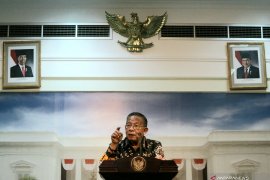We cannot be proud about the condition. But, it is not a bad news."Jakarta (ANTARA News) - The government has expressed concern over the 0.05 percent deflation in September 2015.
"On one hand, it is good but should be a matter of concern, and we need to study the possibility of a decrease in demand," Coordinating Minister for Economic Affairs Darmin Nasution stated here on Thursday.
According to Nasution, deflation has both a positive and negative side.
"We cannot be proud about the condition. But, it is not a bad news," he noted.
He pointed out that the positive side of this condition is that by and large, the food prices did not increase.
Earlier, Indonesia recorded a deflation of 0.05 percent during September 2015, according to the Central Statistics Agency (BPS).
The BPS announced on Thursday that inflation in August this year stood at 0.39 percent, while in September 2014, Indonesia recorded 0.27 percent inflation.
In September 2013, the country suffered a deflation of 0.35 percent.
Head of BPS Suryamin remarked that year-on-year, Septembers inflation was 6.83 percent and core inflation was 0.44 percent, while the yearly core inflation stood at 5.07 percent.
In addition, he noted that the government had successfully controlled the prices after the fasting month of Ramadhan.
Meanwhile, Martin Panggabean from the Indonesia Green Investment Corporations (IGICo) Advisory stated that the government should not rely on foreign countries to boost growth but should focus on improving the domestic economy at a time when the rupiah was weakening against the US dollar.
"Indonesia can no longer rely on the weakening global commodity prices and the Chinese economic recovery," Panggabean affirmed.
"(Neither can it rely on) the Fed, which insists on increasing its interest rate at the end of this year. Instead, it should immediately improve the domestic economy," he emphasized.
According to Panggabean, the market sentiment will not improve if the Indonesian economy did not show signs of recovery.
"The rupiahs exchange rate continues to slide closer to Rp15 thousand per US dollar, and the prices of state debt securities and bonds have not been improving, while the Fed will still increase its interest rate by the end of this year. So, these problems may continue to burden the Indonesian economy, particularly the banking sector," he pointed out.
Martin suggested that the government should immediately continue with its infrastructure projects that are high on the list of its priorities and implement several policies aimed at deregulation and cutting down on bureaucratic red tape. It must consistently stick to achieving its targets in this regard.
Hopefully, the projects will lead to an improvement in the peoples purchasing power and encourage the economy to become robust.
He added that the rupiahs exchange rate against foreign currencies should be safeguarded as it has reached an alarming level.
(Uu.A063/INE/KR-BSR/F001)
Editor: Priyambodo RH
Copyright © ANTARA 2015












